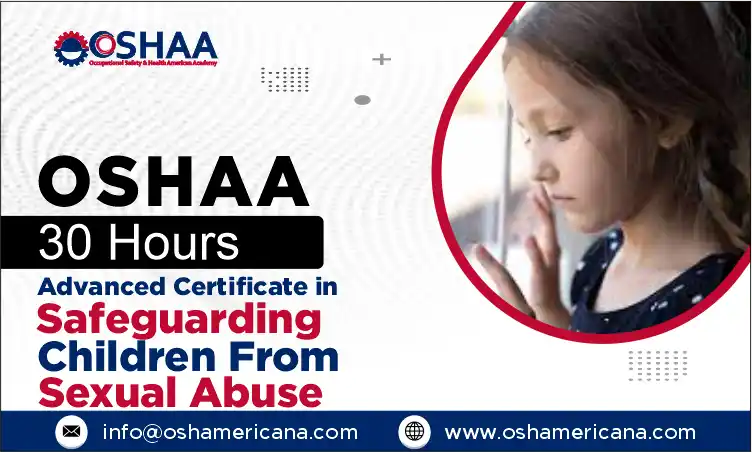Gain Practical Expertise in Food Safety with Professional Training
The OSHAA 30-Hours Food Safety Training is a professional program designed to equip food industry professionals with the knowledge and skills needed to maintain high standards of food safety and workplace hygiene. It is ideal for managers, supervisors, and staff in restaurants, catering, hotels, and food processing facilities who are responsible for handling, preparing, and storing food safely.
This course covers essential topics such as hazard identification, contamination prevention, safe food storage, temperature control, sanitation practices, and the use of personal protective equipment (PPE). Participants also learn to implement HACCP principles, conduct risk assessments, and manage regulatory compliance with OSHA and international food safety standards.
By completing this training, learners gain practical skills that can be applied immediately, helping to reduce foodborne illness risks, improve workplace safety, and protect consumers. The program also enhances professional development, strengthens leadership abilities, and builds confidence in managing food safety systems. For organizations, it promotes efficiency, reduces operational risks, and improves consumer trust.
The OSHAA 30-Hours Food Safety Training is a valuable qualification for professionals seeking to ensure safe food practices, regulatory compliance, and long-term business success.
OSHAA 30-Hours Food Safety Training
To enroll in the OSHAA 30-Hours Food Safety Training, learners are expected to meet the following criteria:
1. Age Requirement
- Learners must be at least 18 years old to participate in the OSHAA 30-Hours Food Safety Training, ensuring that participants have the maturity and responsibility required for professional training.
- Meeting the age requirement allows learners to fully understand workplace responsibilities, regulatory compliance, and food safety protocols.
- This ensures that participants are prepared to handle the professional expectations of the OSHAA 30-Hours Food Safety Training in real-world food industry environments.
2. Educational Background
- A minimum of a high school diploma or equivalent is recommended for entry into the OSHAA 30-Hours Food Safety Training to ensure learners can engage with technical and regulatory content.
- Higher education in hospitality, culinary arts, food technology, health sciences, or related fields is considered an advantage and provides learners with a stronger foundation for advanced food safety knowledge.
- The OSHAA 30-Hours Food Safety Training is designed to be accessible, but participants with prior studies in related fields may find it easier to apply concepts in hazard analysis, risk management, and compliance practices.
- This educational background ensures learners can grasp the complex requirements of food safety laws and workplace safety standards presented in the course.
3. Work Experience
- While no prior work experience is strictly required, it is recommended that learners enrolling in the OSHAA 30-Hours Food Safety Training have some exposure to the food industry, hospitality, or workplace safety practices.
- Professionals already working in restaurants, catering services, food production, or hospitality will benefit significantly from the course, as the training aligns directly with their daily responsibilities.
- The OSHAA 30-Hours Food Safety Training is particularly beneficial for managers, supervisors, and employees with oversight responsibilities, as it strengthens their ability to ensure compliance and safety in food handling.
- For learners without experience, the course provides a solid entry point into food safety management, risk prevention, and compliance-based career growth.
4. English Proficiency
- Learners enrolling in the OSHAA 30-Hours Food Safety Training must have the ability to read, write, and speak English fluently to understand course materials, OSHA regulations, and international food safety standards.
- Strong English proficiency ensures learners can accurately interpret regulatory documents, workplace safety guidelines, and compliance frameworks required by the course.
- This language requirement enables participants to communicate effectively in professional environments and apply the knowledge from the OSHAA 30-Hours Food Safety Training in real-world situations.
- Proficiency in English also ensures that learners can engage fully with training assessments, group discussions, and safety documentation essential for successful completion of the course.
The OSHAA 30-Hours Food Safety Training is carefully designed to balance accessibility with professional standards. By meeting these eligibility requirements, learners ensure they are fully prepared to benefit from the program’s comprehensive focus on workplace safety, food safety compliance, risk management, and regulatory excellence. Meeting these criteria not only supports successful completion of the OSHAA 30-Hours Food Safety Training but also equips participants with the advanced skills and professional qualifications needed to lead food safety initiatives and strengthen organizational performance in a globally competitive industry.
Study Units
Learning Outcomes
The OSHAA 30-Hours Food Safety Training is designed to provide participants with advanced knowledge, practical skills, and compliance expertise required to uphold the highest standards of food safety across the food industry. Through structured study units, this program equips learners with the ability to identify risks, prevent foodborne illnesses, implement HACCP systems, and ensure regulatory compliance. By completing the OSHAA 30-Hours Food Safety Training, participants will gain professional competence, leadership abilities, and the confidence to enforce food safety practices that protect public health and maintain organizational excellence.
Introduction to Food Safety (3 Hours)
- Understand the fundamental principles of food safety and their role in protecting consumer health
- Recognize the importance of compliance with OSHA and international food safety regulations
- Develop the ability to identify risks in different food handling environments
- Gain an overview of how the OSHAA 30-Hours Food Safety Training prepares professionals for advanced safety management
Foodborne Illnesses and Pathogens (4 Hours)
- Identify common foodborne pathogens, their transmission routes, and health impacts
- Learn how improper food handling can lead to outbreaks and legal liabilities
- Apply knowledge to reduce contamination risks within professional food establishments
- Understand the link between foodborne illness prevention and regulatory compliance
Hazard Analysis and Critical Control Points (HACCP) (4 Hours)
- Master the principles of HACCP and their application in food service and manufacturing
- Learn how to conduct hazard identification and risk analysis effectively
- Establish and monitor critical control points to reduce safety risks
- Apply HACCP as a structured framework to ensure compliance with international standards
Personal Hygiene and Sanitation (4 Hours)
- Recognize the critical role of personal hygiene in food safety compliance
- Implement sanitation practices to maintain safe food preparation areas
- Understand how to train and monitor staff for hygiene adherence
- Apply the hygiene standards reinforced throughout the OSHAA 30-Hours Food Safety Training
Food Storage and Temperature Control (4 Hours)
- Learn correct storage methods for perishable and non-perishable food items
- Apply temperature control measures to prevent bacterial growth and spoilage
- Recognize common storage errors that compromise food safety
- Develop strategies to enforce workplace policies that maintain safe storage and compliance
Preventing Contamination in the Food Handling Process (4 Hours)
- Identify common sources of cross-contamination during food preparation
- Implement preventive practices that reduce contamination risks
- Learn advanced food handling methods aligned with OSHA and global standards
- Ensure that contamination prevention is embedded into workplace safety culture
Regulatory Compliance and Food Safety Laws (4 Hours)
- Gain knowledge of OSHA requirements and international food safety laws
- Understand employer and employee responsibilities for compliance
- Recognize the consequences of non-compliance in food industry operations
- Apply the compliance framework emphasized in the OSHAA 30-Hours Food Safety Training
Workplace Health and Safety (3 Hours)
- Understand the integration of food safety and occupational health standards
- Recognize workplace hazards beyond food contamination and apply control measures
- Strengthen leadership skills to implement and enforce safety policies
- Apply a proactive approach to workplace safety as promoted in the OSHAA 30-Hours Food Safety Training
Completing the OSHAA 30-Hours Food Safety Training empowers learners with advanced knowledge, regulatory compliance expertise, and the ability to lead safety initiatives within the food industry. This course not only strengthens individual skills but also fosters a culture of accountability and excellence within organizations. Graduates of the OSHAA 30-Hours Food Safety Training will be fully equipped to enforce strict food safety standards, prevent workplace hazards, and build consumer trust, ensuring that businesses meet both OSHA requirements and international benchmarks for safety and quality.
The OSHAA 30-Hours Food Safety Training provides significant benefits to learners, employers, and industry stakeholders by equipping participants with the advanced knowledge and skills needed to maintain the highest standards of food safety. This course is designed not only to strengthen individual expertise but also to enhance organizational compliance, operational efficiency, and consumer trust. Recognized globally, the OSHAA 30-Hours Food Safety Training ensures that professionals meet regulatory requirements, reduce workplace risks, and foster a proactive safety culture, making it an invaluable investment for food businesses, regulatory bodies, and international food service providers.
1. Comprehensive Knowledge of Food Safety
- Participants gain a deep understanding of essential food safety principles.
- The OSHAA 30-Hours Food Safety Training ensures learners can apply these principles in diverse industry settings.
- This benefit strengthens professional credibility and supports industry-wide compliance.
2. Regulatory Compliance and Legal Protection
- Learners become well-versed in OSHA standards and international food safety laws.
- The course reduces risks of legal penalties and operational shutdowns.
- Businesses gain confidence knowing staff are trained to meet compliance obligations.
3. Prevention of Foodborne Illnesses
- Training focuses on identifying and controlling pathogens and contamination risks.
- Professionals learn to implement preventive measures that safeguard public health.
- This benefit enhances consumer trust and brand reputation.
4. HACCP System Implementation Skills
- The OSHAA 30-Hours Food Safety Training equips learners with HACCP application knowledge.
- Participants gain the ability to identify hazards, monitor critical points, and enforce controls.
- Businesses benefit from structured systems that improve food safety reliability.
5. Improved Workplace Safety Standards
- Learners understand the integration of food safety and occupational health practices.
- The training reduces risks of accidents and workplace incidents.
- Safe working environments improve employee confidence and productivity.
6. Enhanced Professional Development
- Completion of the OSHAA 30-Hours Food Safety Training supports career advancement.
- The certification is globally recognized and adds value to professional profiles.
- Participants become qualified for supervisory, management, and compliance-focused roles.
7. Cost Savings and Risk Reduction
- By preventing foodborne outbreaks and operational failures, businesses save significantly.
- Proper training minimizes product waste, recalls, and liability expenses.
- This benefit improves long-term financial performance.
8. Strengthened Leadership and Management Skills
- The course prepares professionals to lead safety programs within organizations.
- Participants gain skills in training, supervising, and motivating food safety teams.
- This enhances leadership effectiveness and organizational culture.
9. Improved Communication in the Workplace
- Learners develop clear communication strategies to enforce safety policies.
- The OSHAA 30-Hours Food Safety Training emphasizes cross-team collaboration.
- Effective communication strengthens compliance and operational efficiency.
10. Worker Well-Being and Productivity
- The program highlights the importance of worker hygiene, safety, and health.
- Employees are empowered to follow and enforce proper protocols.
- Healthy workplaces lead to improved morale and higher productivity levels.
11. Emergency Preparedness and Crisis Management
- Participants gain the skills to respond effectively to food safety emergencies.
- Training prepares staff for contamination incidents, recalls, and crisis communication.
- Organizations benefit from reduced downtime and effective risk control.
12. Global Standards and International Relevance
- The course aligns with OSHA and international food safety benchmarks.
- Professionals can apply their training across global food supply chains.
- The OSHAA 30-Hours Food Safety Training supports international employability.
13. Continuous Improvement and Innovation
- Learners are encouraged to adopt a proactive, improvement-focused approach.
- The course supports innovation in food safety systems and compliance strategies.
- Businesses gain competitive advantages by maintaining high-quality standards.
14. Increased Consumer Confidence and Trust
- Compliance with the highest safety standards reassures consumers.
- Food businesses trained under the OSHAA 30-Hours Food Safety Training strengthen brand loyalty.
- Trust leads to long-term success and customer retention.
15. Career Recognition and Industry Credibility
- Completing the course demonstrates commitment to professional excellence.
- Learners position themselves as qualified experts in food safety management.
- The certification is valued across industries, from hospitality to manufacturing.
The OSHAA 30-Hours Food Safety Training is a globally recognized program that equips participants with the expertise to ensure compliance, prevent foodborne risks, and enhance organizational performance. By combining regulatory knowledge, practical skills, and leadership development, this course prepares professionals to lead safety initiatives that protect consumers, strengthen compliance, and create a lasting culture of excellence in food safety management.
The OSHAA 30-Hours Food Safety Training is designed for professionals and organizations committed to maintaining the highest standards of workplace safety, food handling, and regulatory compliance. This course is highly relevant to industry leaders, managers, supervisors, and employees across the global food sector who must comply with OSHA regulations, international food safety standards, and organizational safety goals. By completing the OSHAA 30-Hours Food Safety Training, participants gain critical skills in food safety management, risk prevention, and compliance, making it an essential qualification for those who aspire to achieve professional development and operational excellence.
1. Food Safety Managers
- Oversee safety practices within food production, hospitality, and catering environments.
- The OSHAA 30-Hours Food Safety Training enhances their ability to design and enforce safety programs.
- Gain skills in compliance auditing and foodborne risk management.
- Ensure organizations remain compliant with OSHA and international food safety regulations.
2. Restaurant and Catering Supervisors
- Responsible for supervising kitchen staff and maintaining hygiene standards.
- This course equips them to identify potential hazards and enforce preventive controls.
- Learn to train teams effectively in hygiene, sanitation, and food handling.
- Support operational efficiency while meeting safety compliance standards.
3. Health and Safety Officers (HSE Professionals)
- Play a key role in enforcing workplace health and safety protocols.
- The OSHAA 30-Hours Food Safety Training enhances their expertise in foodborne hazard control.
- Gain advanced knowledge in HACCP systems and OSHA-based safety practices.
- Improve workplace safety culture and ensure compliance across operations.
4. Quality Assurance Specialists
- Focus on product quality, safety, and regulatory compliance in food businesses.
- This training strengthens their ability to implement food safety audits and checks.
- Gain the tools to prevent contamination and maintain product integrity.
- Support organizational compliance with OSHA and international safety benchmarks.
5. Operations Supervisors
- Oversee day-to-day business activities in food service and production industries.
- The course provides them with risk management and incident-prevention strategies.
- Learn to integrate food safety into operational workflows.
- Enhance efficiency and reduce costs associated with foodborne safety failures.
6. Food Production Workers
- Directly involved in food preparation, processing, and handling.
- The OSHAA 30-Hours Food Safety Training provides essential skills in hygiene and contamination prevention.
- Gain confidence in following standardized food safety protocols.
- Contribute to safer workplaces and improved product quality.
7. Hospitality and Catering Industry Professionals
- Work in hotels, resorts, and large-scale catering operations.
- This course ensures they are equipped to handle high-volume food service safely.
- Learn how to manage food safety risks in fast-paced environments.
- Align with OSHA and global hospitality safety standards.
8. Food Retail and Supply Chain Managers
- Responsible for maintaining safety across storage, transport, and retail operations.
- The training equips them with knowledge of food storage, temperature control, and logistics safety.
- Ensure compliance throughout the supply chain.
- Strengthen consumer trust by upholding food safety practices.
9. Regulatory and Compliance Officers
- Monitor and enforce food safety standards at local, national, or international levels.
- The OSHAA 30-Hours Food Safety Training enhances their ability to evaluate compliance effectively.
- Gain insights into OSHA guidelines and international safety frameworks.
- Support enforcement strategies that protect public health and industry integrity.
10. Career-Driven Professionals in Food Safety
- Individuals seeking to advance their careers within the food safety sector.
- Completing this course demonstrates commitment to professional growth and global safety standards.
- Gain credentials recognized across industries and regions.
- Position themselves for leadership and compliance-focused roles.
The OSHAA 30-Hours Food Safety Training is a globally recognized program that empowers participants across all roles to strengthen safety culture, enhance regulatory compliance, and develop advanced professional skills. By completing this course, learners not only gain practical expertise in food safety but also achieve an industry-respected certification that enhances organizational efficiency, protects consumer health, and ensures sustainable success in the food sector.







